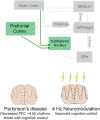Approach to Cognitive Impairment in Parkinson's Disease
- PMID: 33205381
- PMCID: PMC7851260
- DOI: 10.1007/s13311-020-00963-x
Approach to Cognitive Impairment in Parkinson's Disease
Abstract
Cognitive dysfunction is common in Parkinson's disease (PD) and predicts poor clinical outcomes. It is associated primarily with pathologic involvement of basal forebrain cholinergic and prefrontal dopaminergic systems. Impairments in executive functions, attention, and visuospatial abilities are its hallmark features with eventual involvement of memory and other domains. Subtle symptoms in the premotor and early phases of PD progress to mild cognitive impairment (MCI) which may be present at the time of diagnosis. Eventually, a large majority of PD patients develop dementia with advancing age and longer disease duration, which is usually accompanied by immobility, hallucinations/psychosis, and dysautonomia. Dopaminergic medications and deep brain stimulation help motor dysfunction, but may have potential cognitive side effects. Central acetylcholinesterase inhibitors, and possibly memantine, provide modest and temporary symptomatic relief for dementia, although there is no evidence-based treatment for MCI. There is no proven disease-modifying treatment for cognitive impairment in PD. The symptomatic and disease-modifying role of physical exercise, cognitive training, and neuromodulation on cognitive impairment in PD is under investigation. Multidisciplinary approaches to cognitive impairment with effective treatment of comorbidities, proper rehabilitation, and maintenance of good support systems in addition to pharmaceutical treatment may improve the quality of life of the patients and caregivers.
Keywords: Parkinson’s disease; cholinesterase inhibitors; deep brain stimulation; dementia; mild cognitive impairment; neuromodulation; neuropsychology; neurorehabilitation..
Figures

References
-
- Emre M, Aarsland D, Brown R, Burn DJ, Duyckaerts C, Mizuno Y, et al. Clinical diagnostic criteria for dementia associated with Parkinson’s disease. Mov Disord. 2007;22(12):1689–707. - PubMed
-
- Goldman JG, Sieg E. Cognitive impairment and dementia in Parkinson disease. Clin Geriatr Med. 2020;36(2):365–77. - PubMed
-
- Uc EY, Rizzo M, Anderson SW, Qian S, Rodnitzky RL, Dawson JD. Visual dysfunction in Parkinson disease without dementia. Neurology. 2005;65(12):1907–13. - PubMed
Publication types
MeSH terms
Substances
Grants and funding
LinkOut - more resources
Full Text Sources
Medical

